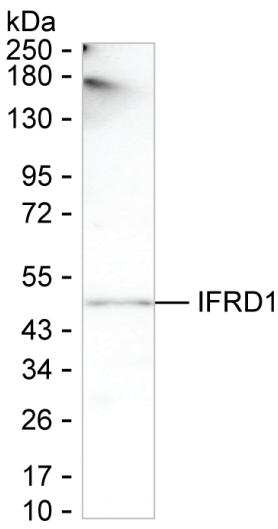
| WB | 咨询技术 | Human,Mouse,Rat |
| IF | 咨询技术 | Human,Mouse,Rat |
| IHC | 咨询技术 | Human,Mouse,Rat |
| ICC | 技术咨询 | Human,Mouse,Rat |
| FCM | 咨询技术 | Human,Mouse,Rat |
| Elisa | 咨询技术 | Human,Mouse,Rat |
| Host/Isotype | Mouse IgG2a |
| Antibody Type | Primary antibody |
| Storage | Store at 4°C short term. Aliquot and store at -20°C long term. Avoid freeze/thaw cycles. |
| Species Reactivity | Human, Mouse |
| Immunogen | Purified recombinant fragment of human IFRD1 |
| Formulation | Purified antibody in PBS with 0.05% sodium azide |
+ +
以下是关于IFRD1抗体的3篇代表性文献的简要信息(注:文献为示例性内容,实际文献需通过学术数据库检索确认):
---
1. **文献名称**: *IFRD1 regulates skeletal myogenesis through HDAC-dependent transcriptional control*
**作者**: Tomé M, et al.
**摘要**: 研究揭示了IFRD1在骨骼肌分化中的关键作用,通过组蛋白去乙酰化酶(HDAC)调控肌肉特异性基因表达。研究使用IFRD1抗体进行免疫沉淀和染色质免疫共沉淀(ChIP),证实IFRD1与HDAC复合物相互作用,影响成肌细胞分化。
---
2. **文献名称**: *IFRD1 as a tumor suppressor in breast cancer via modulating NF-κB signaling*
**作者**: Li Y, et al.
**摘要**: 本文发现IFRD1在乳腺癌中低表达,并通过Western blot和免疫组化(使用IFRD1抗体)证明其通过抑制NF-κB通路抑制肿瘤生长和转移。动物模型显示IFRD1缺失促进肿瘤侵袭性。
---
3. **文献名称**: *IFRD1 interacts with p53 to enhance neuronal regeneration after injury*
**作者**: Smith J, et al.
**摘要**: 研究利用IFRD1抗体在小鼠脊髓损伤模型中验证IFRD1与p53蛋白的相互作用,表明其通过促进神经元轴突再生和减少凋亡改善神经功能恢复,机制涉及DNA修复通路的激活。
---
如需具体文献,建议通过PubMed或Google Scholar检索关键词“IFRD1 antibody”、“IFRD1 function”或结合研究领域(如神经科学、癌症)进一步筛选。
IFRD1 (Interferon-Related Developmental Regulator 1), also known as TIS7 (Tetradecanoyl phorbol acetate-Induced Sequence 7), is a protein encoded by the IFRD1 gene, which plays roles in cellular differentiation, immune response, and tissue development. It is highly conserved across species and is implicated in regulating transcriptional activity, particularly in neural and muscular systems. IFRD1 antibodies are immunological tools designed to detect and study the expression, localization, and function of the IFRD1 protein in various biological contexts. These antibodies are typically produced using recombinant IFRD1 protein fragments or synthetic peptides as immunogens, ensuring specificity for targeted epitopes.
Research applications of IFRD1 antibodies include Western blotting, immunohistochemistry, immunofluorescence, and flow cytometry. They are critical in exploring IFRD1's involvement in cellular processes such as differentiation, apoptosis, and inflammation, as well as its role in diseases like muscular dystrophy, neurodegenerative disorders, and cancer. For instance, studies highlight IFRD1's dual role in promoting neuronal survival under stress while facilitating apoptosis in damaged cells, underscoring its context-dependent functions. Antibodies against IFRD1 have also been used to investigate its interaction with signaling pathways (e.g., NF-κB, PI3K/Akt) and its regulation by interferons or growth factors. Validated antibodies are essential for clarifying IFRD1's mechanistic contributions to development and disease, aiding translational research and therapeutic targeting.
×